‘Are you going to pay… or not?’: Untangling RCC’s late payment practices
Words: Angela Skujins
Pictures: Angela Skujins, Daniel Marks, Harry Allwood, Matt Carter, Jack Fenby, Dave Court
RCC is one of Adelaide’s most-hyped Fringe hubs, flooding social media with photos of crammed crowds and stacked music lineups.
But several contractors allege the organisation left them in thousands of dollars of debt months after the 2020 festival was packed down.
Standing outside the large fenced-off RCC Fringe site on Tarndanyangga Victoria Square, you can feel the thump of the music flowing through your body as it floods into the city.
Patrons stream into the site past security guards and COVID check-ins, ready to see acrobats, interstate musicians and local deejays at one of Adelaide’s coolest festival venues.
It’s hard to resist the pull of the RCC.
But this success has sometimes come at a cost to those involved in the festival in years prior, with CityMag collecting claims from a chorus of managers, sound technicians and creative consultants who say they’ve had to claw back owed money from the business after months of waiting.
The largest claim of debt we’ve uncovered is more than $30,000.
Some of these contractors took RCC to court, others say they have entered payment plans with the company, and some are still waiting to see their invoices fully paid.

When the founder of Sydney-based touring and management agency Top Shelf, Jordan Verzar, asked RCC Fringe to pay a five-week overdue invoice from the 2020 season, RCC’s managing director Roberto Cardone told him in an email to wait and be “grateful”.
“He said, ‘being grateful in these times would be appreciated as would time’ – and this is five weeks after we were supposed to be paid,” Jordan tells CityMag. (CityMag has read the emails and can confirm the correspondence).
“He sends me another email telling me how many other people need to be paid and that we’re all in the same boat.
“I’m massively grateful for people that put on gigs, but I’m massively grateful to the artists who I represent… I’m like, ‘Well, dude, are you going to pay what is owing to my artists or not?’”
In the same email thread between Jordan and Roberto, in an exchange dated 26 March 2020, the managing director said: “We are still in the process of reconciling the RCC 2020 event from our end.

RCC 2020. This picture: Harry Allwood
“This process will continue for some time as a result of the current pressures of COVID-19, the effective shut down of the (sic) our entire industry and all future planning for our company and staff.”
In a subsequent email that day, Roberto said: “I’m sure COVID-19 will effect (sic) your commission and income as well going forward, as I have not received any income and will not be going forward”.
RCC 2020 concluded on Sunday, 15 March, one day before the Federal Government enforced a 500-person cap on mass gatherings due to the coronavirus, and eight days before the broader hospitality and events industry was forced to shut down on 23 March 2020.
Jordan is a 20-year veteran of the industry, and last year managed the bookings for two high-profile touring groups at RCC Fringe: US cult music icon Amanda Palmer (a 2020 Adelaide Fringe Ambassador) and avant-garde jazz trio The Necks.
These contracts were in the tens of thousands of dollars.
Jordan held up his side of the bargain by getting his performers to the University of Adelaide for the arts and music festival.
He alleges it then took weeks of hounding through numerous emails and phone calls to be paid the residual gig fee.
Jordan says that if not for the intervention of Adelaide Fringe CEO Heather Croall, he is uncertain when or how much he would have been paid.
“The issues were resolved once Heather stepped in,” Jordan says.
When asked if the Adelaide Fringe had paid any of RCC’s debts, the Adelaide Fringe did not respond to direct questions.
Instead, Festival Director Heather Croall offered a written statement, saying the Adelaide Fringe is an open-access festival, and all venues register their events with the organisation and then the Adelaide Fringe sells the tickets.
“RCC registers in Fringe with events in the same manner as all venues do. Adelaide Fringe makes payments to artists and venues based on Box Office sales.”
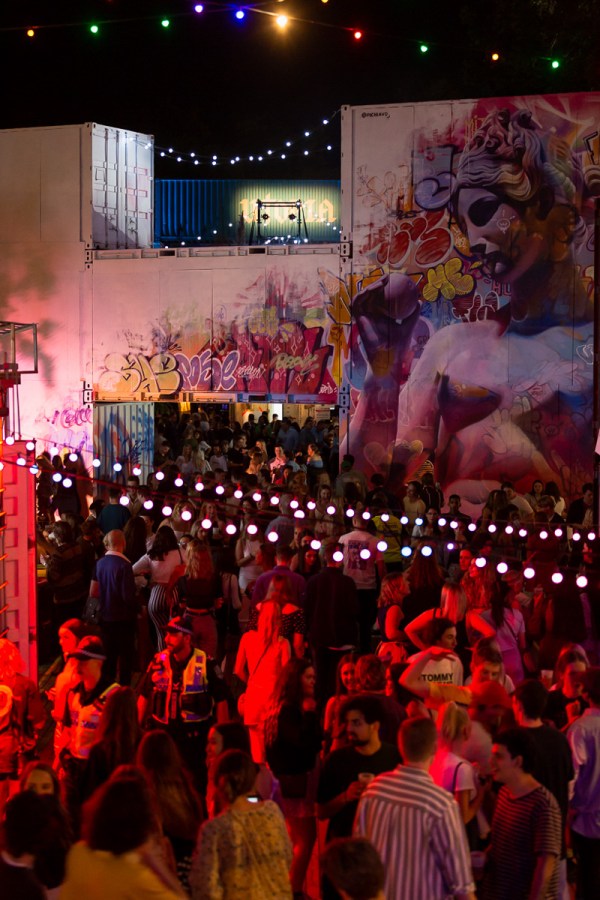
RCC 2020. This picture: Harry Allwood
Jordan says although the gig invoice was eventually settled, if you don’t get paid “it can be pretty catastrophic”.
“This is because a lot of the time you might have advanced costs for things like flights, accommodation,” he explains.
“The managers and artists still need to pay their base touring costs, their travel, accommodation, rent, their staff. There’s a whole knock-on effect of a whole bunch of other people that get affected when artists don’t get paid.”
For many within the arts industry (and the broader gig economy), invoicing for work already completed is common practice.
According to a recent study conducted by the Australian Small Business and Family Enterprise Ombudsman, 20 per cent of businesses wait an average of 60 days to be paid for an invoice. Three per cent wait more than 120 days (roughly four months).
Once an invoice is lodged, the time at which the payment is made is dictated by the payer. There’s little someone in Jordan’s position can do but wait, chase up the invoice by phone and email, and, if all else fails and cashflow allows, launch legal action.
CityMag put Jordan’s claims of late payment to RCC, but the organisation declined to answer direct questions. Instead, the festival issued a statement which “strongly refuted” all claims we asked about. (Go to the bottom of this story to read RCC’s comment.)
But Jordan’s allegation does not stand alone.

A CHEQUERED PAST
Founded in 2014 by entrepreneurs Stuart Duckworth and Tom Skipper as the Royal Croquet Club, the ambitious pop-up bar “entertained thousands of revellers” in its first year in Tarndanyangga Victoria Square, with food and drink stalls, music performances and games of croquet on offer.
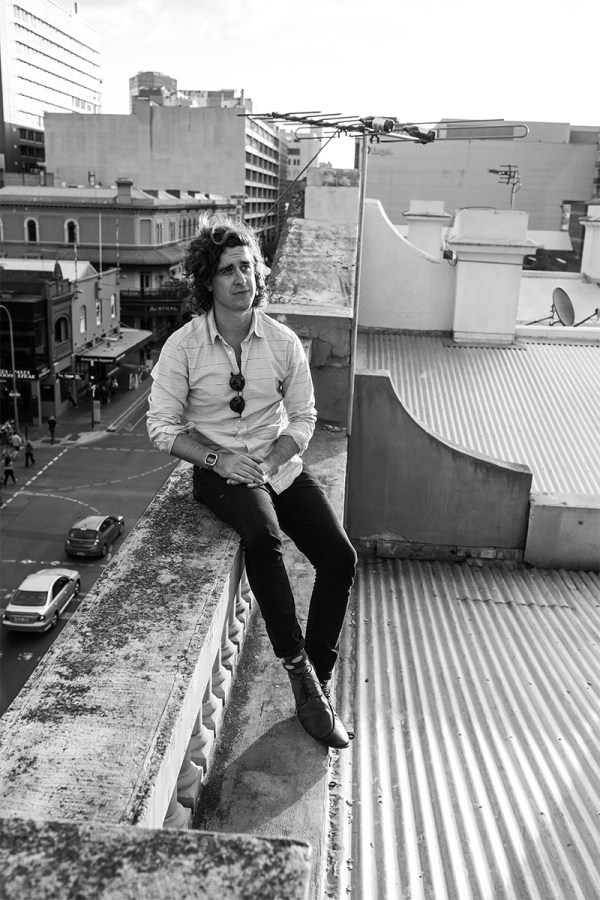
Stuart Duckworth. This picture: Ben McPherson
In 2016, the festival travelled to China’s Qingdao International Beer Festival under the banner of the Royale Adelaide Club, aiming to showcase “the very best that South Australia has to offer”, including booze brands and musicians.
The $3.4 million joint venture between the Australian Trade Alliance and RCC co-founders was a failure, resulting in more than $1 million in losses and both Royal Croquet Club Adelaide and Stuart and Tom’s company The Social Collective going into voluntary administration.
In 2018, managing director of investment firm 1835 Capital, Jason Di Iulio, purchased RCC assets from administrators and rebranded the event as RCC Fringe.
The finance expert then sold the festival in 2019 to MOMENTARILY PTY LTD, a company owned by CIBO Espresso co-founder and then-RCC Fringe COO Roberto Cardone.
That year, the festival moved from its Tarntanya Wama Pinky Flat location to the University of Adelaide’s Cloisters area, with original founder Stuart Duckworth maintaining a role within the company.
RCC held events on the university grounds in early 2019 and 2020.
In November 2020, the University of Adelaide announced RCC would be forced to find a new home, as “the University of Adelaide and arts event RCC have concluded their [two-year] arrangement”.
In December 2020, an application was lodged with the City of Adelaide for the RCC to return to its original Tarndanyangga Victoria Square location for a 2021 event.
It was at this time last year CityMag was made aware of contractors alleging they had worked on the 2020 event and were still yet to be paid.

Daniel Teuma works for Melbourne-based touring and music marketing agency Novel, and handled bookings for artists FJAAK, Jasper James and SPFDJ at RCC 2020.
The agent told CityMag in November he was owed nearly $11,000 for the combined performances, and it was “interesting” RCC was planning for a 2021 season “with no communication to their creditors.”
“I’ve spoken to RCC and we expect to enter a payment plan soon,” he said in a subsequent email.
“It’s been a tough year and I’m supportive of promoters forging ahead whilst in debt as long as they communicate to their creditors regarding plans for payment.
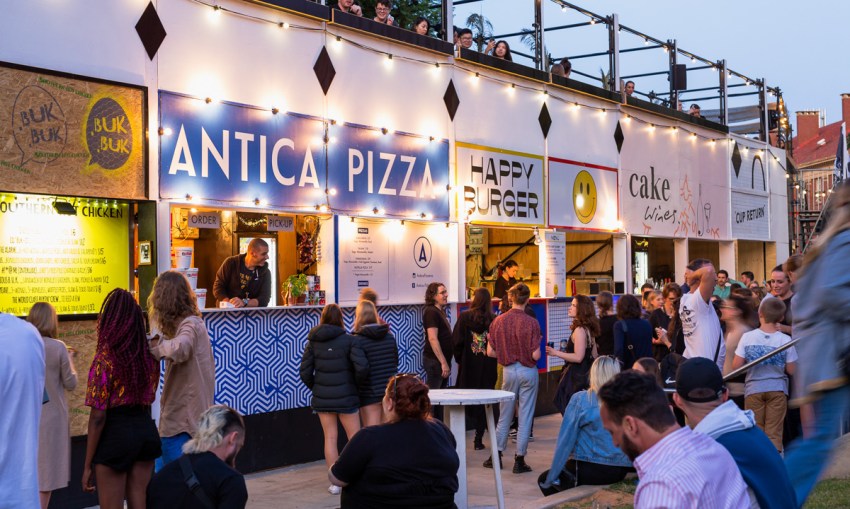
Food vendors at the RCC 2020 event. This picture: Harry Allwood
“We look forward to RCC paying their debts in due course”.
Daniel told CityMag in March 2021 RCC had not missed a single payment from the payment plan.
When we asked RCC to comment on Daniel’s claim, they declined to respond.
Another creative contractor who worked the 2020 festival, and provided comment on the condition of anonymity, said in December – nine months after the festival concluded – they too were in a “situation” with RCC regarding payments.
“RCC have been saying they’re trying to find a solution for months and they started paying – little amounts of money – to all those whom they owed money,” the source says.
“I hope they are able to pay their debts in full soon. We are all in the same situation.”
In February 2021 this creative contractor told CityMag RCC had delivered the first payment as part of their payment plan. This is 10 months after the 2020 season concluded.
RCC did not respond to direct questions from this anonymous person’s claim.
Roberto made his case for RCC returning to Tarntanyangga Victoria Square at a City of Adelaide council meeting in December 2020. The existence of unpaid invoices was not discussed at the meeting.
City of Adelaide’s Associate Director of City Culture, Christie Anthoney, tells CityMag there were no grounds to reject RCC’s initial application.

RCC 2020. This picture: Matt Carter
“[RCC’s] event application, like all event applications, was subject to all the usual checks required, including credit checks,” she says.
“The event application was also assessed against the Adelaide Park Lands Event Management Plan and meets the Victoria Square / Tarntanyangga event site criteria.”
South Australian spokesperson for the Media, Entertainment and Arts Alliance, Aaron Connor, says there is a history of MEAA union members seeking wage reclamation from the RCC.
“It’s very prevalent [that] our crew members have got reclamation from RCC,” Aaron says.
“It’s very difficult getting paid in a timely manner – and this isn’t specific to one organisation in South Australia. It’s an unfortunate reality.
“There’s a risk of losing a lot of the talent we have here because they’re not supported.
“Ultimately if you have a contract it needs to be upheld.”
Aaron couldn’t tell us the exact number of complaints filed from workers of the 2020 season, but anecdotally says those who were paid tend to be “on top of the pile” and “squeaky wheels”.
We asked RCC to respond to Aaron’s comments, but they declined.

Some late payment claims CityMag uncovered date back to the 2019 RCC event.
Nick Waterman is the founder of Adelaide-based audio-visual production company Scene Change and was contracted to supply RCC’s 2019 festival with technicians, lighting and audio equipment for a run of shows in the University of Adelaide’s Scott Theatre.
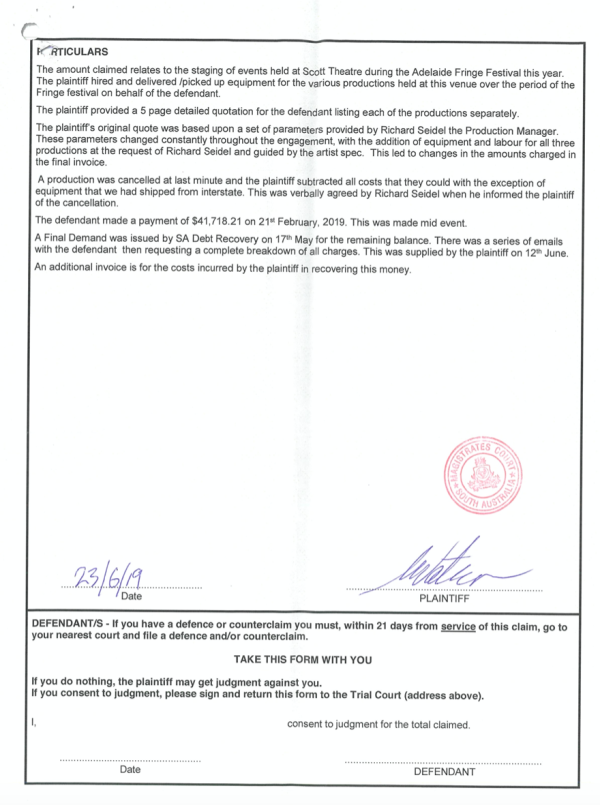
A page from Scene Change’s claim against RCC
Nick says RCC paid the initial deposit late, and when the remainder was due, “they went quiet”.
“They essentially just refused to pay,” he says.
“They were just arguing, and we couldn’t get a response out of them.
“Obviously we’re not going to pull the pin on all the artists and not make the show happen, so we continued to do it while we worked with them in the background.
“Then, when it came time at the end of the show, they refused to pay.”
Unable to reach a resolution, Nick filed a $14,065 debt recovery claim against Momentarily in June 2019. A settlement was eventually reached, and he has been paid.
Nick accepts this is not solely an issue with RCC, and says he took legal action against the company because he knew there could be others in a similar position who were unable to afford legal representation.
“I did it purely out of principle because this has happened too many times to so many people in our industry,” Nick says.
When CityMag asked RCC to respond to Nick’s version of events and the court case, they did not respond.
Another contractor from the 2020 event CityMag spoke to under condition of anonymity claimed to have been paid late by RCC and credits the Adelaide Fringe with helping them get the money owed.
“Without [the Adelaide Fringe] I would still be fretting,” they tell CityMag.
We asked the Adelaide Fringe what protections they offer employees, artists and subcontractors to ensure they are paid. They did not respond directly.
“While the Adelaide Fringe supports all registered venues and artists, it does not oversee the operation and management of any venues that run during the festival,” Festival Director Heather Croall says in a statement.
She adds the festival operates with a split settlement service, “whereby a portion of the Box Office settlement is paid directly to the artist and a portion to the venue”.
“In recent years, Adelaide Fringe has slashed inside charges from ticket sales ensuring artists and venues receive more of the ticket price than ever before,” Heather says.
“Additionally, Adelaide Fringe continues to raise funds to lower charges even further for artists and venues.
“The split settlement service ensures each party is paid their Box Office entitlements.”
This year’s Adelaide Fringe Festival featured 900 events and sold a total of 632,667 tickets, worth $16.4 million, as reported by InDaily.
Another payment recovery claim, filed in April 2020 (approximately three weeks after the RCC 2020 season ended) by refrigerator container service CRS CONTAINER RECOND SERVE PL sought $5271.01 from RCC.

Part of CRS CONTAINER’s claim against RCC
The minor civil claim says RCC “Purchased 30 New IBC’s [intermediate bulk containers]” and “only paid a deposit of $2500.00” and not the remaining balance within seven days.
The claim also says RCC sold back 26 of the IBCs to the company, “but still the difference has not been paid being $5128.01 and emails and calls go unanswered or with promises not met.”
The owner of CRS CONTAINER RECOND SERVE PL did not respond to questions from CityMag regarding the claim, and RCC also declined to comment. The status of the claim, according to court documents, is closed.

Another debt recovery claim was levelled against RCC Fringe relating to its 2020 season in July last year, with a creative consultant, who requested not to be named, seeking $34,204.95 from the company.
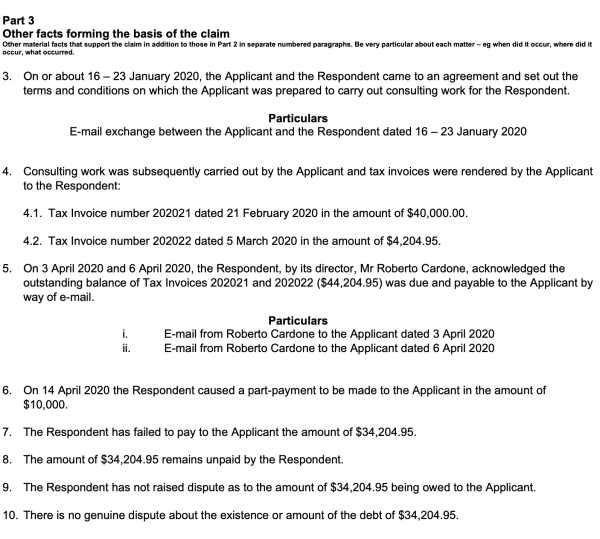
A snapshot of the $34,204 debt recovery claim
The claimant declined to offer further comment to CityMag, except to say the dispute was settled out of court. They did confirm they are currently on a payment plan with RCC.
When asked to respond to this court claim, RCC once again declined to respond, arguing the information provided is not correct.
CityMag is part of the Solstice Media publishing family (alongside InDaily and SALIFE), which was also put on a payment plan following the RCC 2020 season.
In lieu of responding to direct questions from CityMag about the accusations and court claims levelled against them, a spokesperson for RCC issued a statement, which you can read below:
“RCC will not be responding to the individual questions requested by Solstice Media.
“The information that has been provided from various parties, including anonymous sources is not correct and is strongly refuted by the RCC.
“RCC is an event that has been in existence for over 8 years, employing thousands of South Australians and local, interstate and international artists. In addition to entertaining over 1 million visitors, RCC has an annual economic contribution of close to $10m to the state each year.
“Even in a COVID world the team behind RCC is proud to be able to present a program for RCC 2021 that was collated in 7 weeks. RCC is committed to supporting and creating opportunity for over 250 artists, employment for over 200 South Australians and engaging with over 50 South Australian companies.”
In the absence of direct answers to our questions and further details from RCC, it is unknown whether the company denies that money was owed and delayed payments occurred or if it asserts there was a good reason for holding back payment.
CityMag hasn’t been contacted with any payment concerns about RCC 2021, so whatever issues may have created problems in the past may no longer be applicable to the company.

